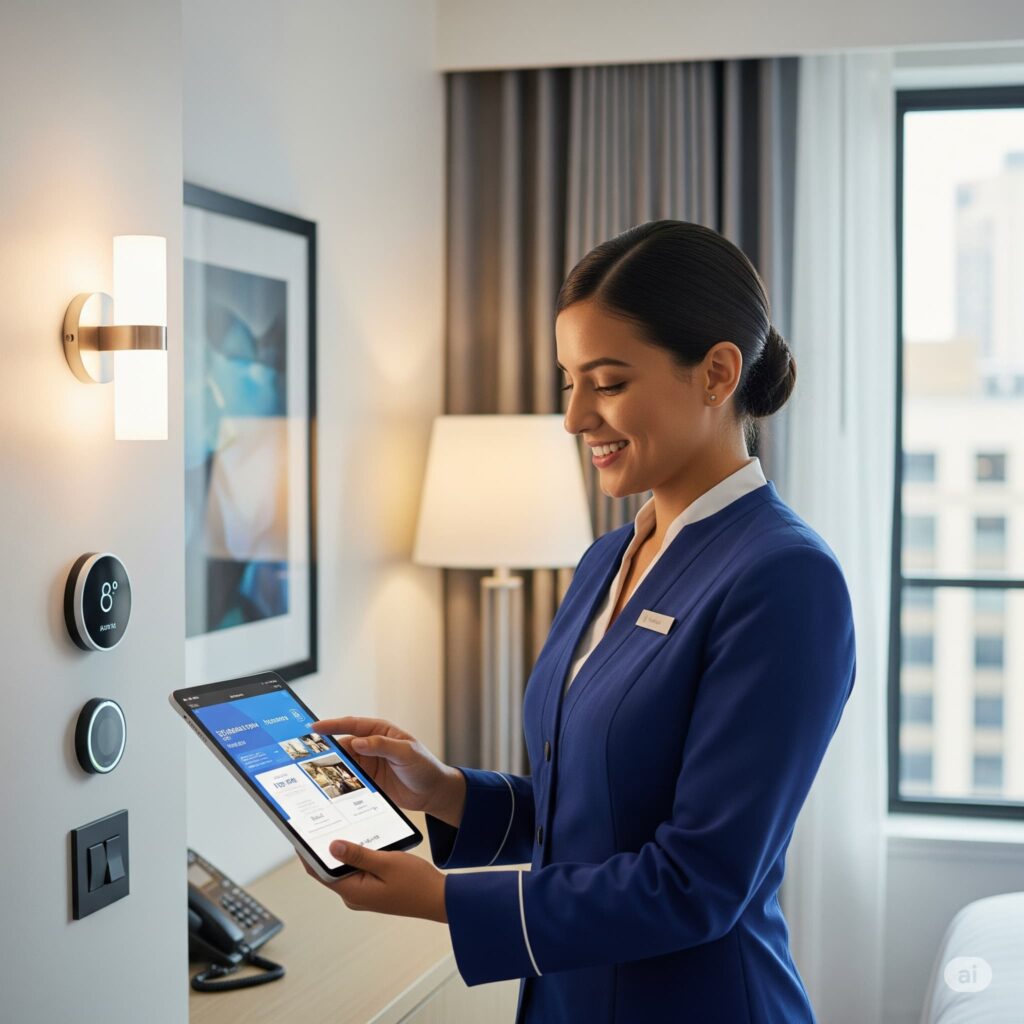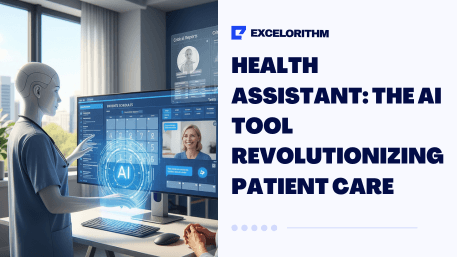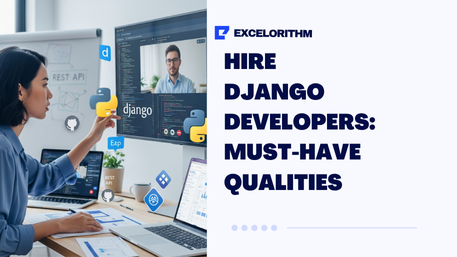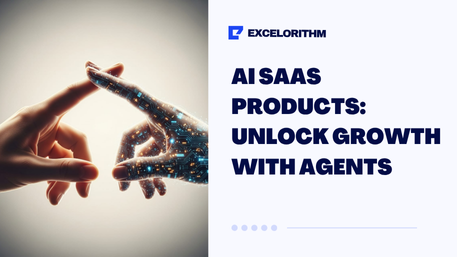
Introduction
In the past, excellence in hospitality was defined by personalized greetings, perfectly timed service, and the intuitive ability of staff to anticipate guest needs. While these hallmarks remain important, they are no longer sufficient on their own. The modern guest, shaped by hyper-personalized digital experiences in sectors like retail and entertainment, expects seamless and intelligent service from their hotel stay as well.
Yet, the industry faces enormous pressure. Labor shortages following the pandemic have made it difficult to maintain service levels. Operational costs are rising. Guest expectations continue to evolve rapidly. In this environment, the hospitality industry is being reshaped by necessity—and artificial intelligence is at the core of that transformation.
AI is not just automating processes. It is creating new opportunities for deeper, more meaningful engagement. It allows hotels, resorts, and service providers to reclaim what makes hospitality truly special: the ability to serve with insight, personalization, and efficiency—at scale.
Rethinking Hospitality in a Post-Pandemic World
The global pandemic fundamentally altered the way travelers interact with hospitality services. The initial push toward contactless experiences evolved into a broader movement for efficiency, safety, and digital convenience. What was once a nice-to-have—like app-based check-ins or chat support—became an expectation. AI in hospitality began playing a critical role in bridging service gaps left by reduced staffing, managing sudden changes in travel patterns, and personalizing services in real time.
Importantly, AI has shown it can deliver this without diminishing the warmth of service. By handling routine tasks and offering intelligent support, AI gives hospitality teams the freedom to focus on the human moments that matter most. When deployed responsibly and with strategy, AI can bring back the essence of hospitality—thoughtful, responsive, and emotionally aware service—even in times of operational strain.
Understanding What AI Really Means in the Hospitality Industry
The term “AI” can feel abstract, but in practical terms, it refers to systems that learn from data and make decisions or recommendations based on that learning. In the hospitality context, this includes technologies such as natural language processing for chatbots, machine learning for predictive maintenance, and computer vision for facial recognition check-ins.
Unlike traditional automation, which executes pre-programmed commands, AI is dynamic. It can analyze patterns, adapt to new situations, and improve over time. For hotel operators, this means smarter systems that can adjust to guest preferences, anticipate demand, and reduce inefficiencies—all while improving the bottom line.
Transforming the Guest Experience: From Reactive to Proactive
Perhaps the most powerful impact of AI in the hospitality industry lies in its ability to transform the guest experience. Where once hotels reacted to guest needs—responding to complaints, answering questions, or offering promotions after the fact—AI enables a proactive, anticipatory approach.
For example, AI-powered chatbots and virtual assistants are now capable of conducting real conversations with guests. Thanks to advancements in natural language processing, these tools can understand not just the words a guest uses, but the sentiment behind them. A guest expressing frustration about a delayed check-in receives not just an apology, but a personalized offer to make amends, along with priority handling. The interaction feels timely and thoughtful—because it is.
In-room experiences are also becoming more responsive. Smart systems now adjust lighting, temperature, and entertainment based on the known preferences of returning guests. Voice-enabled assistants allow for effortless control of room amenities, providing a touch of modern luxury that also increases accessibility for all guests.
Redefining Personalization at Scale
Before AI, personalization in hospitality was limited by staff capacity. Remembering a frequent guest’s room preferences or sending a birthday greeting required manual input and coordination. With AI, those touchpoints are automated, scalable, and consistent.
When a guest books a stay, their past behavior is instantly analyzed. If they always choose upper-floor rooms, the system reserves one. If they typically order a vegetarian breakfast, the dining team is notified. If they celebrate a birthday during their visit, the front desk can prepare a complimentary gesture. This type of memory—reliable, immediate, and contextual—is what elevates a stay from transactional to unforgettable.
More than convenience, this level of personalization builds loyalty. Guests feel recognized, valued, and understood. Over time, this emotional connection becomes a key differentiator in an increasingly competitive landscape.
Behind the Scenes: AI Driving Operational Excellence
While the guest-facing benefits of AI are often more visible, the technology’s impact on hotel operations is equally transformative. AI is now central to how many properties manage inventory, plan staffing, and maintain facilities.
Predictive maintenance is one of the most valuable applications. By collecting data from HVAC systems, elevators, kitchen equipment, and more, AI systems can forecast when a breakdown is likely to occur. This means maintenance can be scheduled proactively, reducing downtime, preventing guest inconvenience, and lowering emergency repair costs.
Similarly, AI-driven inventory systems help streamline procurement and reduce waste. They learn from usage patterns to anticipate demand for everything from toiletries and linens to food and beverage supplies. By preventing overstocking and minimizing shortages, these systems support smoother operations and tighter cost control.
Even staffing decisions are being optimized with AI. Based on occupancy forecasts, reservation patterns, and historical performance, AI tools can suggest ideal staffing levels for each department, each day. This helps ensure excellent service delivery without overspending on labor during slower periods.
Key Applications of AI in the Hospitality Industry
Artificial Intelligence is increasingly redefining the hospitality industry by enhancing guest experiences, optimizing operational processes, and improving overall business performance. The following outlines the principal applications of AI that are currently driving innovation within the sector:
1. Personalized Guest Experiences
AI-powered data analytics enable hospitality providers to gain a comprehensive understanding of guests’ preferences and behaviors. By analyzing historical booking data, online interactions, and customer feedback, AI systems facilitate the delivery of highly personalized recommendations concerning accommodations, amenities, dining options, and local activities. Such tailored services contribute significantly to elevated guest satisfaction and foster customer loyalty.
2. AI-Enabled Chatbots and Virtual Assistants
The deployment of AI-based chatbots and virtual assistants on digital platforms allows for the provision of instantaneous, round-the-clock customer service. These AI agents efficiently manage routine inquiries, including booking confirmations, check-in and check-out procedures, and general information requests, thereby enabling human staff to focus on more complex guest needs. Furthermore, multilingual capabilities of these systems enhance accessibility for a diverse international clientele.
3. Dynamic Pricing and Revenue Optimization
AI algorithms analyze a multitude of factors, including market trends, competitor pricing, seasonal fluctuations, and local events, to adjust room rates dynamically. This real-time pricing mechanism maximizes revenue by attracting bookings during periods of lower demand and optimizing profitability during peak seasons. AI-driven revenue management systems thus provide hospitality enterprises with a strategic advantage in competitive markets.
4. Operational Efficiency and Predictive Maintenance
AI applications contribute to operational excellence by forecasting demand patterns and optimizing workforce allocation, thereby minimizing inefficiencies related to staffing. Additionally, AI-powered predictive maintenance systems monitor critical infrastructure and equipment, such as HVAC units and elevators, enabling early detection of potential malfunctions. This proactive approach reduces downtime and maintenance expenditures.
5. Enhanced Security and Fraud Prevention
AI technologies bolster security protocols by analyzing surveillance data for anomalous activities and detecting fraudulent transactions throughout the booking and payment processes. Continuous learning algorithms adapt to emerging threats, ensuring robust protection for both guests and hospitality providers.
6. Voice Recognition and Intelligent Room Automation
Voice recognition systems integrated with AI permit guests to control room environments—including lighting, climate control, and entertainment—through simple verbal commands. Intelligent room automation further personalizes the guest experience by automatically adjusting settings in accordance with individual preferences, thereby enhancing comfort and convenience.
7. AI in Food and Beverage Management
AI optimizes food and beverage operations by enabling precise demand forecasting, thereby reducing waste and improving inventory management. Additionally, AI-driven systems support the creation of customized menus tailored to dietary restrictions and preferences, contributing to an elevated culinary experience.
Enhancing Revenue Management with Intelligence
Hotels have long relied on revenue management strategies to optimize room rates and occupancy. With AI, these strategies become significantly more precise and responsive.
Dynamic pricing systems powered by AI monitor a vast array of variables—competitor pricing, local events, booking trends, weather forecasts, and more—to determine the optimal rate for each room in real time. This granular approach allows hotels to capture greater value from each booking without alienating guests with inconsistent pricing.
AI also refines guest segmentation. Rather than using broad demographic categories, machine learning models analyze real behavior to group guests based on their preferences, spending habits, and responsiveness to offers. Marketing efforts become sharper, with campaigns that speak directly to the right audience at the right time.
For example, one segment might respond well to early booking discounts, while another values upgrades or spa packages. AI enables personalized pricing, promotion, and packaging at scale.
A Holistic View: AI Across the Entire Guest Journey
The real power of AI emerges when it is embedded across the full spectrum of the guest experience—from planning to post-stay engagement. This creates a coherent, continuous journey that feels tailored and effortless.
During the research and booking phase, AI enhances search results, filters room options based on preferences, and offers intelligent recommendations. Booking engines learn which layouts, amenities, or deals appeal to each user, increasing conversion rates.
Upon arrival, guests experience minimal friction. AI enables app-based check-ins or facial recognition at kiosks, removing the need for paperwork or queues. Room access is seamless, either via mobile devices or biometric systems.
Throughout the stay, AI enhances every interaction. Chatbots respond instantly to requests. Smart room systems adapt to preferences. Automated service scheduling ensures that housekeeping, dining, and concierge support are timely and coordinated.
After departure, AI continues to work. Feedback is collected and analyzed. Sentiment analysis helps hotels understand what worked and what didn’t. Guests receive follow-up offers tailored to their interests, increasing the likelihood of return bookings.
Ethical AI and the Responsibility of Hoteliers
With great power comes great responsibility. AI’s ability to collect, process, and act on data requires careful consideration. The hospitality industry must lead with ethics as well as efficiency.
Privacy is a primary concern. Biometric data, browsing history, and behavioral patterns can reveal deeply personal information. Hotels must be transparent about what data is collected and how it is used. Clear opt-in policies, data encryption, and adherence to regulations such as GDPR are essential.
Bias in AI is another serious issue. If not carefully monitored, algorithms can reflect and amplify existing inequalities. For example, voice assistants that don’t recognize non-native accents or recommendation engines that overlook certain cultural preferences can erode trust. Diverse data sets and inclusive design practices are critical to creating AI systems that serve all guests equitably.
Finally, over-automation must be avoided. Guests should never feel like they’re being managed by machines. When AI makes the experience feel cold or impersonal, its value is lost. The best systems allow for seamless transitions between AI and human service, with clear escalation paths when a human touch is needed.
Real-World Adoption and Success Stories
Leading hospitality brands are already demonstrating how AI can drive performance.
Hilton introduced “Connie,” a robot concierge that answers common questions, provides directions, and recommends local attractions. Not only does Connie assist guests, but it also gathers insights into frequently asked questions and peak demand times.
Marriott has invested in AI to power its dynamic pricing systems and personalize marketing campaigns. Its loyalty app uses AI to recommend tailored offers and local experiences, resulting in improved customer engagement.
Accor has deployed AI for operational optimization, including staff planning and energy management. Smaller brands and independent hotels are also embracing AI through partnerships with tech startups that offer plug-and-play platforms for messaging, CRM, and analytics.
Pitfalls to Avoid
- Over-automation: Don’t lose the personal touch.
- Bias in AI: Ensure algorithms are trained on diverse data sets.
- Cultural tone-deafness: AI must be multilingual and culturally sensitive.
- Neglecting transparency: Guests should know when they’re interacting with AI.
Future Trends to Watch
- Emotion AI: Understanding and responding to guest emotions.
- AI Concierge Apps: Hyper-personalized guest experience platforms.
- Voice-Activated Rooms: Using voice commands for room controls.
- Autonomous Service Robots: For housekeeping and room service.
Frequently Asked Questions
Is it possible for AI to replace humans in hospitality?
While AI can take over repetitive and data-driven tasks, it cannot replicate the emotional intelligence and cultural nuance required for true hospitality. The best outcomes come from AI working alongside human staff to enhance service, not replace it.
How big is AI in the hospitality industry?
The market for AI in hospitality is projected to surpass $10 billion globally by 2032, growing rapidly due to the demand for personalization, automation, and cost efficiency. It spans everything from guest engagement tools to back-office systems.
Which software is mostly used in the hospitality industry?
Some of the most widely adopted platforms include Oracle Hospitality Cloud, Opera PMS, ALICE (for operations), Salesforce Hospitality Cloud (CRM), and various AI-based chatbot and marketing platforms like Revinate and Asksuite.
Will machines replace humans in the hospitality business?
Machines will likely take over administrative and routine functions. However, roles that involve empathy, leadership, and creative service delivery will remain deeply human. AI supports staff by handling what machines do best—so people can focus on what they do best.
Final Thoughts
The hospitality industry stands at a defining moment. With challenges to staffing, cost, and consistency, hotels must find new ways to deliver excellence. AI offers not only operational solutions but also a pathway to rediscover the heart of hospitality: service that is personal, responsive, and emotionally resonant.
AI in hospitality is no longer a futuristic vision—it’s here, it’s powerful, and it’s already making a difference. From smart rooms to intuitive marketing and intelligent operations, artificial intelligence in the hospitality industry is helping businesses do more, with less, and with greater guest satisfaction.




